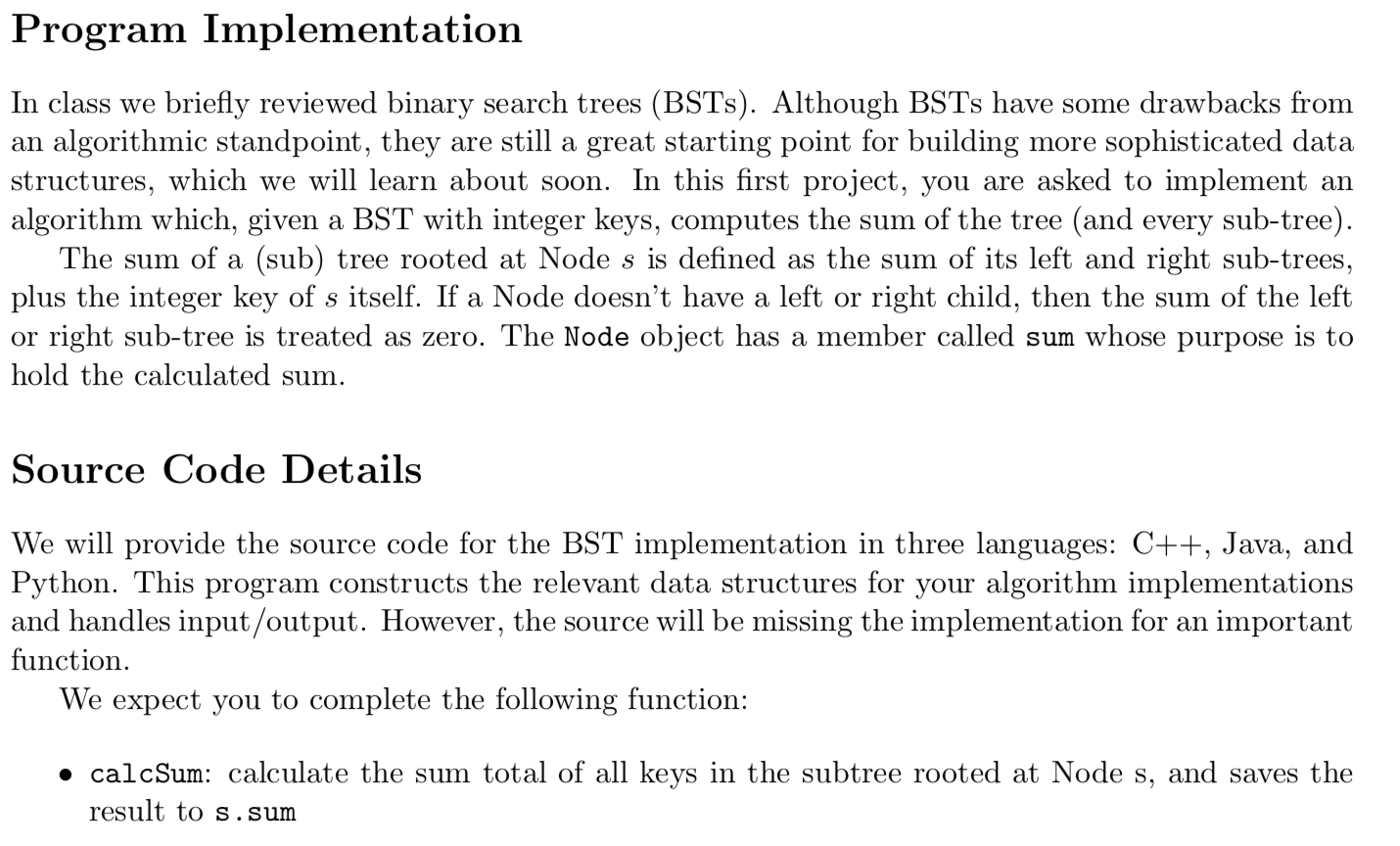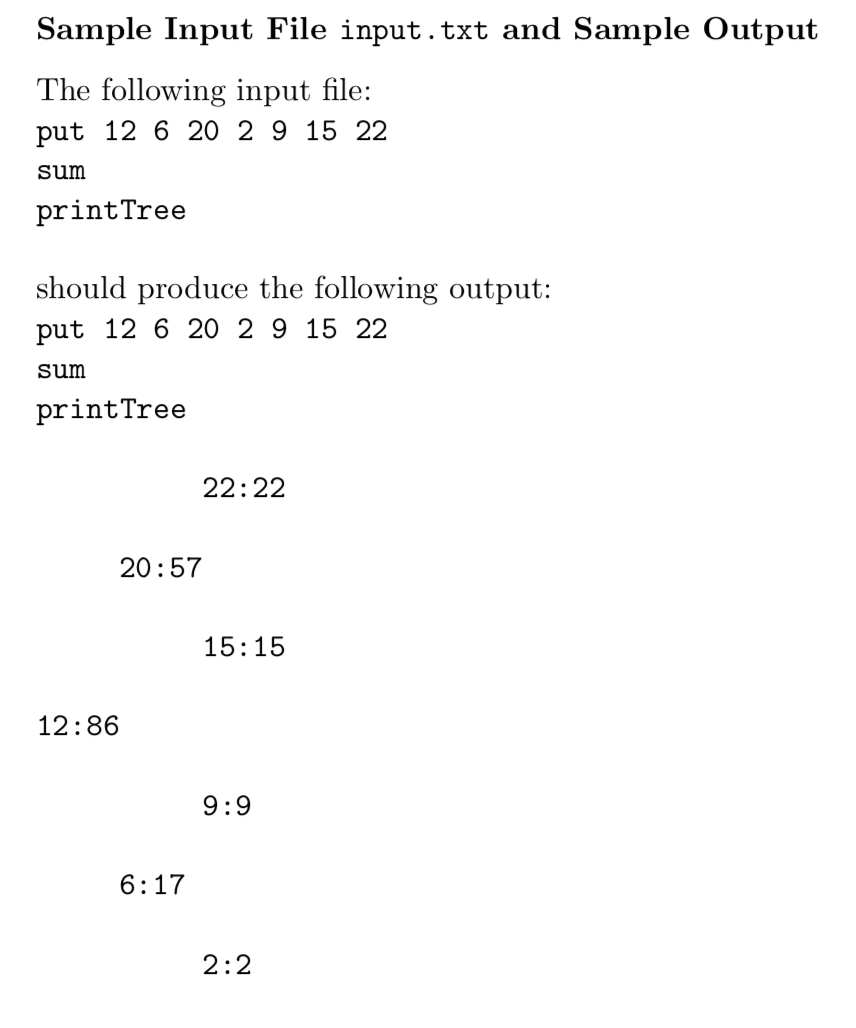Question: The main.cpp code is this: #include #include #include #include #include #include #include #include #include #include using namespace std; // Utility functions void loadFile(string fname, fstream&


The main.cpp code is this:
#include
#include
#include
#include
#include
#include
#include
#include
#include
#include
using namespace std;
// Utility functions
void loadFile(string fname, fstream& file)
{
file.open(fname.c_str());
if (file.fail())
{
cout
}
}
// converts string to lowercase
string lowercase(string s)
{
for (unsigned int i = 0; i
{
s[i] = std::tolower(s[i]);
}
return s;
}
/*
*Purpose: Class definition of a partial implementation of an ordered map ADT,
mapping integers keys to nothing, using a binary search tree (BST)
*NOTE: For simplicity, and consistency with implementation in other programming languages (e.g., Java and Python), the documentation below refers to variables that are actually pointers to a node in the tree simply as a node in the tree, without the pointer qualification, whenever the distinction is clear from the context
*NOTE: For consistency with implementation in other programming languages, this implementation does not overload the ++ operator to implement the successor function; similarly for the -- and the predecessor function
*/
class BSTMap
{
// simple data structure used to create nodes for (linked-list) BST-based implementation of an ordered map ADT
public:
struct Node {
int key;
int ht;
int sum;
Node* left;
Node* right;
Node* parent;
Node(int k, int s) :
key(k), sum(s), left(NULL), right(NULL), parent(NULL) { }
Node(int k, int s, Node* l, Node* r, Node* p) :
key(k), sum(s), left(l), right(r), parent(p) { }
};
public:
typedef BSTMap::Node Node;
public:
Node* root;
private:
int n;
protected:
void printAux(const Node* w) const; // print utility
public:
BSTMap() : root(NULL), n(0) { };
Node** find(int k) const;
Node* put(int k);
void calcSum(Node* s);
int size() const;
bool empty() const;
void print() const; // print as parenthetic string
void printTree(Node* s, int space) const;
};
/*
*Purpose: Implement member functions/methods of BSTMap class
*/
// utility/aux function to print out a parenthetic string representation of the BST
// INPUT: a node w in the BST whose subtree is to be printed out; or NULL
void
BSTMap::printAux(const Node* w) const {
if (w) {
cout key sum
cout
printAux(w->left);
cout
printAux(w->right);
cout
}
}
// print out a parenthetic string representation of the whole BST
void
BSTMap::print() const {
printAux(root);
cout
}
// prints out a string representation of the whole BST using a reverse inorder traversal
void
BSTMap::printTree(Node* s, int space) const {
int addSpace = 8;
// base case
if (!s)
{
return;
}
// add more whitespace
space = space + addSpace;
// print right
this->printTree(s->right, space);
cout
for (int i = addSpace; i
cout
cout key sum
// print left
this->printTree(s->left, space);
}
// INPUT: a key k, as an integer
// OUTPUT: a 2-element array, where
// element 0 is w, the node with key k, if k is already in the ordered map, or NULL otherwise; and
// element 1 is z, the parent of node w, or NULL if w is NULL or the root
// or the last node visited while trying to find a node with key k in the BST
BSTMap::Node**
BSTMap::find(int k) const {
Node* w = root;
Node* z = NULL;
while (w && (w->key != k)) {
z = w;
w = (w->key > k) ? w->left : w->right;
}
Node** wAndZ = new Node*[2];
wAndZ[0] = w;
wAndZ[1] = z;
return wAndZ;
}
// INPUT: an integer key
// OUTPUT: if k is already in the ordered map, then output the node containing k
// otherwise, output the new node in the tree with the corresponding key k.
// POSTCONDITION: a node with key k exists in the BST
// if the BST was empty, then the new node becomes the root of the BST (and thus its only node)
BSTMap::Node*
BSTMap::put(int k) {
Node** wAndZ = find(k);
Node* w = wAndZ[0];
Node* z = wAndZ[1];
delete wAndZ;
if (w) {
return w;
}
Node* x = new Node(k,0,NULL, NULL,z);
if (z) {
if (z->key > k) z->left = x;
else z->right = x;
}
else root = x;
n++;
if (n == 1) root = x;
return x;
}
// INPUT: a pointer to a Node in the tree s
// PRECONDITION:
// POSTCONDITION:
void
BSTMap::calcSum(Node* s) {
// Your code here
}
// OUTPUT: size of the tree
int
BSTMap::size() const {
return n;
}
// OUTPUT: true if the tree is empty; false otherwise
bool
BSTMap::empty() const {
return (!root);
}
int main() {
string inputFilename = "input.txt";
string line;
BSTMap B;
// open input file
fstream inputFile;
loadFile(inputFilename, inputFile);
while (getline(inputFile, line))
{
// trim whitespace
// echo input
cout
// parse input using a stringstream
stringstream lineSS(line);
string token;
string command;
// store tokens in a vector
vector
while (getline(lineSS, token, ' '))
{
// trim whitespace
token.erase(token.find_last_not_of(" \t") + 1);
tokens.push_back(token);
}
if (tokens.size() > 0)
{
command = tokens[0]; // first token is the command
}
else
{
command = "";
}
if (command == "put")
{
// insert a node for each key specified
for (unsigned int i = 1; i
{
B.put(stoi(tokens[i]));
}
}
if (command == "sum")
{
B.calcSum(B.root);
}
if (command == "print")
{
B.print();
}
if (command == "printTree")
{
B.printTree(B.root, 0);
}
}
inputFile.close();
return EXIT_SUCCESS;
}
input.txt:
put 12 6 20 2 9 15 22
sum
printTree
Program Implementation In class we briefly reviewed binary search trees (BSTs). Although BSTs have some drawbacks from an algorithmic standpoint, they are still a great starting point for building more sophisticated data structures, which we will learn about soon. In this first project, you are asked to implement an algorithm which, given a BST with integer keys, computes the sum of the tree (and every sub-tree). The sum of a (sub) tree rooted at Node s is defined as the sum of its left and right sub-trees, plus the integer key of s itself. If a Node doesn't have a left or right child, then the sum of the left or right sub-tree is treated as zero. The Node object has a member called sum whose purpose is to hold the calculated sum. Source Code Details We will provide the source code for the BST implementation in three languages: C++, Java, and Python. This program constructs the relevant data structures for your algorithm implementations and handles input/output. However, the source will be missing the implementation for an important function. We expect you to complete the following function: calcSum: calculate the sum total of all keys in the subtree rooted at Node s, and saves the result to s.sum Sample Input File input.txt and Sample Output The following input file: put 12 6 20 2 9 15 22 sum printTree should produce the following output: put 12 6 20 2 9 15 22 sum printTree 22:22 20:57 15:15 12:86 9:9 6:17 2:2
Step by Step Solution
There are 3 Steps involved in it

Get step-by-step solutions from verified subject matter experts


